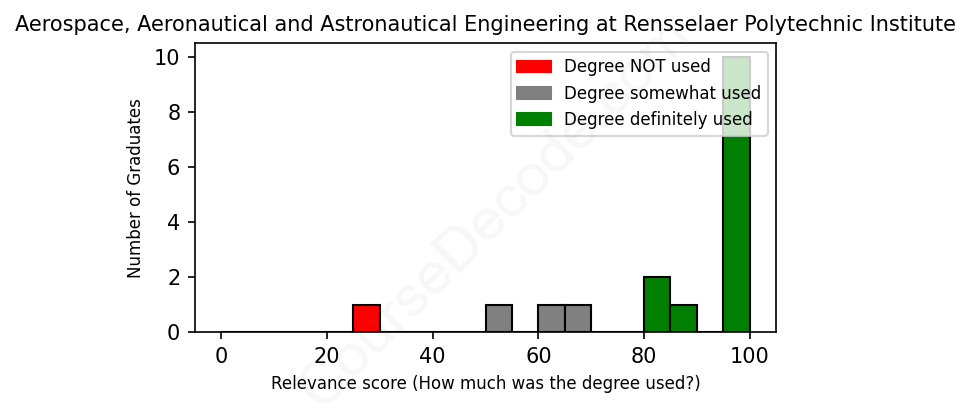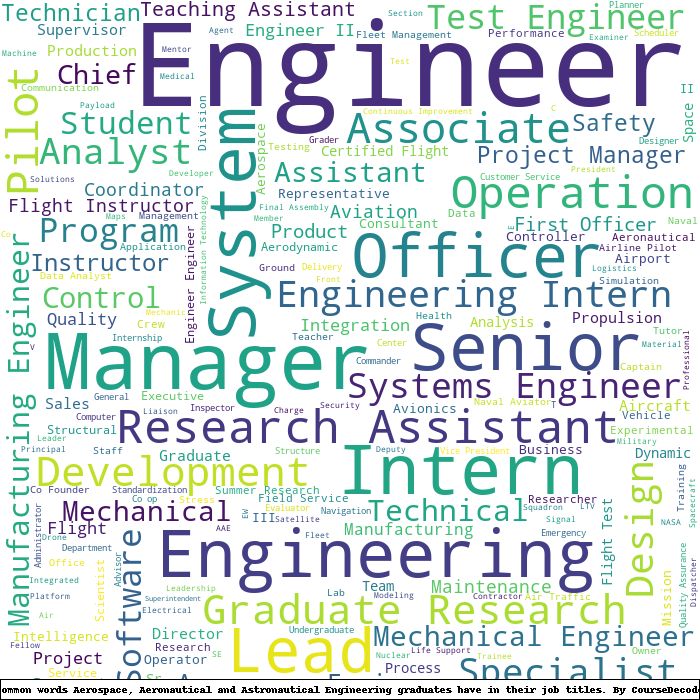
First, some facts. Of the Aerospace, Aeronautical and Astronautical Engineering graduates from Rensselaer Polytechnic Institute we've analyzed , here's how many have used (or NOT used) their degree in their career:

These are estimates based on AI analysis of 17 LinkedIn profiles (see below).
The verdict? Significantly above average. Overall, with an average relevance score of 85%, Aerospace, Aeronautical and Astronautical Engineering graduates from Rensselaer Polytechnic Institute have a much higher likelihood (+18%) of finding work in this field compared to the average graduate across all fields:
And for comparison, here's the chart for all profiles we've looked at across all degrees.
Also, after graduating, 47% of these graduates have pursued further education other than another Bachelor's degree (such as a Masters degree or other), compared to the average across all profiles of 35%. This suggests you may need more than just a Bachelors degree to be competitive as a Aerospace, Aeronautical and Astronautical Engineering graduate.
See the details:
|
Relevance score: 100% We think this person has gone into a career highly relevant to their degree. We think this person has gone into a career highly relevant to their degree.
DEGREE INFOGraduated in 2021 from Rensselaer Polytechnic Institute with a Bachelor of Science - BS in Aerospace, Aeronautical and Astronautical Engineering. No other secondary education since. JOB HISTORY SINCE GRADUATIONGold Bar Diversity Recruiter United States Air Force May 2021 - Apr 2022 Student Pilot  United States Air Force Apr 2022 - May 2024 Pilot  United States Air Force May 2024 - Present ABOUTI am from a small town in upstate New York where I completed my High School education at Christian Brothers Academy. I then went to college at Rensselaer Polytechnic Institute where I spent five years completing Air Force ROTC, a Bachelors of Science Degree in Aeronautical Engineering, a Masters of Engineering Degree in Aeronautical Engineering, as well as a Minor in Joint Military Studies. I am now a First Lieutenant in the United States Air Force as a student pilot. |
The top 10 most common jobs done by the graduates we've analyzed (ranked most common to least) are:
From what I've seen, graduates from Rensselaer Polytechnic Institute with degrees in Aerospace, Aeronautical, and Astronautical Engineering tend to land quite a few gigs that are directly tied to their major. Most commonly, they work for big players in the aerospace industry like Boeing, NASA, and Northrop Grumman. Positions like Thermal Analysis Engineer, Mission Assurance Engineer, and Structural Analyst show that many graduates are deeply involved in roles that require specialized knowledge in areas like thermal analysis, structural integrity, and mission oversight. This demonstrates that their education aligns well with their job responsibilities, ensuring they use what they've learned in the classroom in their daily work.
However, it’s also interesting to note that not every job holds the same level of relevance. Some graduates have taken roles that might not be strictly about aerospace engineering, like a Simulation Engineer at Meta or an Analyst at MUFG. These positions may still utilize engineering skills, but they don't focus on the core principles of aerospace technology as much as some other jobs do. Overall, it seems like most graduates manage to find roles that make strong use of their specialized education, even if a few drift a bit outside the direct realm of aerospace engineering.
Here is a visual representation of the most common words in job titles for Aerospace, Aeronautical and Astronautical Engineering graduates (this is across all Aerospace, Aeronautical and Astronautical Engineering graduates we've analyzed, not just those who went to Rensselaer Polytechnic Institute):

Graduates from Rensselaer Polytechnic Institute who majored in Aerospace, Aeronautical, and Astronautical Engineering generally have pretty solid and relevant career trajectories right out of college. Many start their careers at major aerospace companies like Boeing, Northrop Grumman, and NASA, often landing roles such as engineers, analysts, or even in management positions within a few years. For instance, graduates from the class of 2011 and 2012 began at top firms and stayed on paths that kept them connected to the aerospace field. It's encouraging to see that they frequently climb the ladder to roles with increasing responsibility, like becoming managers or leading projects. Most of them seem to stay within the aerospace sector, which is a clear indication that their degree is well-aligned with their career choices.
Looking at the long-term over a span of 5 to 10 years, it appears that many graduates are not only still engaged in aerospace careers, but they may also venture into leadership roles or specialized positions. For instance, those who graduated more recently are becoming project engineers, structural engineers, or even pilots in the military. There are also those taking on innovative roles in research and development, like an Aerospace Research Engineer. While there are a few graduates who have taken on other roles not strictly tied to aerospace—like moving into financial analysis or other industries—most seem to remain quite successful and relevant to their field. Overall, it looks like RPI's aerospace graduates generally enjoy fruitful careers closely linked to their studies and training, which is great news for anyone considering a degree in this area!
Getting a Bachelor’s degree in Aerospace, Aeronautical, and Astronautical Engineering can be pretty challenging, especially at a school like Rensselaer Polytechnic Institute, which is known for its rigorous academic standards. You’ll dive headfirst into complex subjects like fluid dynamics, thermodynamics, and structures, and yes, math will be your constant companion. It’s definitely not a walk in the park—there will be late nights and tough projects, but if you have a passion for flight and space, it can also be super rewarding. Overall, it’s on the harder side compared to many other degrees, so be ready to put in the effort!
Most commonly, in the LinkedIn profiles we've looked at, it takes people 4 years to finish a Bachelor degree in Aerospace, Aeronautical and Astronautical Engineering.
Looking at these RPI grads in aerospace and aeronautics, it seems like they've done pretty well in terms of their careers and earning potential. Many of them landed solid jobs at big companies like Boeing, NASA, and Northrop Grumman right after graduation, which usually means a decent starting salary—often in the range of $70,000 to over $100,000, depending on experience and position. As they moved up in their careers, especially those who took on leadership roles or specialized positions, it’s likely their salaries increased even more, especially with employers like NASA where salaries can be pretty competitive. So yeah, they seem to be making some good money overall, especially considering the skills and expertise involved in those fields.
Here is a visual representation of the most common words seen in the "about" section of LinkedIn profiles who have a Bachelor degree in Aerospace, Aeronautical and Astronautical Engineering (this is across all Aerospace, Aeronautical and Astronautical Engineering graduates we've analyzed, not just those who went to Rensselaer Polytechnic Institute). This may or may not be useful:

Here are all colleges offering a Bachelor degree in Aerospace, Aeronautical and Astronautical Engineering (ordered by the average relevance score of their Aerospace, Aeronautical and Astronautical Engineering graduates, best to worst) where we have analyzed at least 10 of their graduates:
| College | Score | Count |
|---|---|---|
 Texas A&M University Texas A&M University
|
87 | 22 |
 California Polytechnic State University-San Luis Obispo California Polytechnic State University-San Luis Obispo
|
86 | 12 |
 University of Cincinnati University of Cincinnati
|
86 | 10 |
 Purdue University Purdue University
|
85 | 40 |
 Rensselaer Polytechnic Institute Rensselaer Polytechnic Institute
|
85 | 17 |
 Georgia Institute of Technology Georgia Institute of Technology
|
84 | 23 |
 Liberty University Liberty University
|
81 | 21 |
 Iowa State University Iowa State University
|
80 | 16 |
 University of Colorado Boulder University of Colorado Boulder
|
80 | 13 |
 California State Polytechnic University-Pomona California State Polytechnic University-Pomona
|
79 | 13 |
 United States Naval Academy United States Naval Academy
|
77 | 12 |
 The Ohio State University The Ohio State University
|
76 | 20 |
 University of Central Florida University of Central Florida
|
75 | 25 |
 Arizona State University Arizona State University
|
74 | 12 |
 University of Michigan University of Michigan
|
74 | 10 |
 Embry-Riddle Aeronautical University Embry-Riddle Aeronautical University
|
71 | 163 |
 Penn State University Penn State University
|
68 | 12 |
 Florida Institute of Technology Florida Institute of Technology
|
67 | 20 |
 The University of Alabama in Huntsville The University of Alabama in Huntsville
|
67 | 11 |
 Embry Riddle Aeronautical University-Worldwide Embry Riddle Aeronautical University-Worldwide
|
66 | 10 |
 University of Illinois at Urbana-Champaign University of Illinois at Urbana-Champaign
|
48 | 10 |